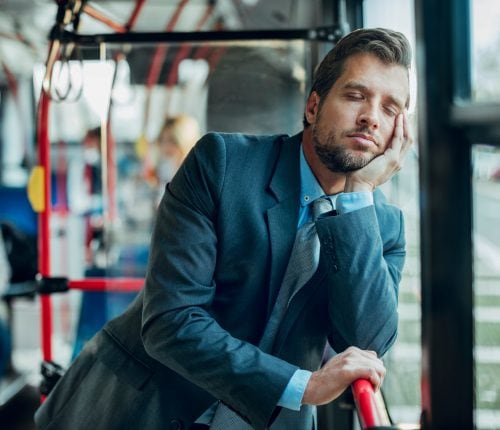
Losing sleep? You could be losing more than that.
The symptoms of sleep apnoea are everyday complaints so they often go undetected. Dr Janet Franklin opens our eyes to its subtle signs.
Many of us feel tired a lot of the time and it’s easy to blame the hectic pace of life. But if you feel as if you’re running on empty and your vitality has gone AWOL, there could be another culprit: sleep apnoea. Although more common in men, this potentially serious condition also affects women and often goes undiagnosed. In fact, many experts believe that the incidence of sleep apnoea is growing alongside the rising rate of obesity because excess weight plays a big part in this sleep problem. Though snoring can be a symptom, it isn’t the only clue to this elusive condition, so think of the following advice as your wake-up call.
What exactly is sleep apnoea?
Sleep apnoea occurs when a sleeping person’s airway is blocked, making you gasp for air or stop breathing.
This syndrome comes in two main types, with obstructive sleep apnoea (OSA) the most commonly reported kind. OSA happens when soft tissue narrows or blocks the sleeping person’s airway. This can occur several times during the night, waking the sleeper so that breathing can resume. Carrying excess weight is a leading cause of OSA.
These mini waking episodes are usually brief, and the sufferer may be oblivious to them, but apnoea’s breathless blips cause sleep fragmentation, the interruption of normal sleeping patterns. Of course, fatigue is the most direct result, but inadequate sleep can even disrupt hormones.
Why worry about sleep apnoea?
Sleep apnoea can have a hugely negative impact on a person’s life, as it affects mood, thinking and energy levels. Those affected by sleep apnoea may find it hard to concentrate or remember things, feel unmotivated and be less productive at work. In fact, people who have untreated sleep apnoea are four to nine times more likely to be involved in a car accident (compared with people who don’t suffer from the disorder). The condition can also lower your libido and interfere with relationships in other ways.
On top of all that, untreated OSA increases your chances of developing a range of health problems, including depression, type 2 diabetes, high blood pressure and heart disease.
A lesser-known, but equally important, effect is that several aspects of sleep apnoea conspire to minimise your ability to lose weight. When you’re tired, you’re more sluggish during the day and therefore less motivated to exercise. Fatigue can also lead to anxiety and depression, both of which can play havoc with your eating habits. Tiredness also triggers metabolic changes, such as increased insulin resistance, which can heighten your risks of obesity and type 2 diabetes.
What are the warning signs of sleep apnoea?
Some women experience typically male symptoms, such as snoring, pauses in breathing, waking during the night, gasping for air or choking and waking in the morning feeling unrested. Both sexes may also complain of restless legs at night or excessive sleepiness during the day.
Despite its shared symptoms, sleep apnoea can often present differently in women so it can easily go undiagnosed. Warning signs include tension, morning headaches, poor concentration, fatigue, insomnia (including an inability to stay asleep) and mood disorders (such as depression).
Women with sleep apnoea may also receive a misdiagnosis of anything from work-related burnout, menopausal changes or depression to anaemia, diabetes or hypothyroidism.
Wouldn’t I know if I had sleep apnoea?
Not necessarily, as many people are unaware of their disturbed sleep. As a result, a partner or other people living in the house are left to comment on the loud snoring, the pauses in breathing or the gasps for air that they sometimes hear.
Given the unspecific nature of sleep apnoea’s symptoms, women may put up with them for many years, if not decades — they don’t seek diagnosis or treatment because they’ve simply become used to the daytime sleepiness and overall fatigue.
Who’s at risk?
Sleep apnoea can affect anyone, but some factors increase risk:
- Being male – men are twice as likely to be diagnosed with sleep apnoea
- Women going through menopause are more likely than premenopausal women to have sleep apnoea, as are women who are pregnant and women with polycystic-ovary syndrome
- Being overweight or obese
- Having a family history of sleep disturbances or sleep apnoea
- Having a large neck circumference
- Having certain facial characteristics, such as an abnormal bite, a small jaw, a high, narrow soft palate or a small chin
- Lifestyle factors such as taking sedatives at night, drinking alcohol and smoking can also increase your chances of developing sleep apnoea.
- Allergies causing nasal congestion can also contribute to sleep apnoea.
What can I do if I think I have sleep apnoea?
If you have any of the aforementioned symptoms, and other treatments aren’t helping, see your GP. Also talk to a doctor about sleep apnoea if you are getting a healthy seven to eight hours’ sleep a night but still feel unrested and lack energy. If so, consider whether you’re also bothered by any of the following problems: headaches in the morning, frequent waking during the night (either to urinate or not) and sensations of gasping or choking while you sleep.
Other telltale signs include waking with a dry mouth or sore throat (or both) in the morning, and easily falling asleep when you would normally be awake during the day, such as when you’re in a car (as a passenger), at a meeting or concert or watching TV.
If treatment proves necessary, your doctor can refer you to a specialist for an overnight sleep study, a test that measures your body’s physiological changes during your sleep.
How does excess weight affect sleep apnoea? Can losing weight ease symptoms?
When we gain weight, fat pads build up around our upper airway. When we lie down at night and relax, these pads close over our airway, preventing the passage of air. This lack of air in the lungs triggers a series of physical reactions to wake us so we can take a breath, hence the fragmented sleep patterns of sleep apnoea. The good news is that most people have to lose just five to 10 per cent of their body weight to improve their sleep or enjoy remission of the condition.
Does it matter how I lose weight? Are there other dietary factors to consider?
Trying to lose weight when you have sleep apnoea can be challenging, because poor sleep can increase appetite and decrease motivation and energy levels. For successful weight loss, you need to adopt healthy eating habits that will help you deal with these factors.
To sustain energy and better regulate appetite, include foods that have a low glycaemic index (GI), such as multigrain bread in your diet. When energy levels dip, reaching for a sugary snack is a bad idea, as this fleeting energy boost can increase cravings for even more sugary foods to sustain the high.
When poor-quality sleep starts sapping your energy, caffeinated or guarana-based beverages can seem like a smart quick fix. If you drink these in the afternoon or evening, however, they can disturb sleep patterns even further. Water, herbal teas and decaffeinated beverages are much better options.
Limiting alcohol is essential to both weight-loss and recovery from sleep apnoea. Alcohol not only stimulates our appetite and weakens our willpower but also serves up copious kilojoules.
Alcohol affects sleep apnoea because its sedative properties relax muscles, those of the upper airway in particular. (People often notice that they snore more after drinking.) Aim to have at least two alcohol-free days a week, and when you do drink, choose low-kilojoule options such as light beer or spirits mixed with soda water or diet soft drinks.
Physical activity is an important component of any long-term weight-loss program, but exercise is usually the last thing you feel like doing when you are tired or lacking in motivation. As a consequence, you may need to be treated for sleep apnoea before regular exercise starts to feel easier. Start with an appropriate level of activity and build on that over time. Exercise will lift your motivation, give you energy, help you lose weight and reduce any restlessness at night.
Is there anything else I can do?
Sleep hygiene is a term that describes the quality of a person’s sleeping habits. Naturally, poor sleep hygiene can aggravate sleep-apnoea symptoms. To maintain good sleep hygiene:
- Keep regular bedtimes and waking times, ideally with seven to nine hours between them.
- Avoid staying awake for prolonged periods.
- Avoid using sedatives, particularly sleeping pills, as these can worsen sleep apnoea.
- Stop vigorous exercise at least three hours before bedtime. This gives your body time to cool and slow down, increasing your chances of both falling asleep and staying asleep.
You don’t have to put up with constant fatigue — if you suspect you have sleep apnoea or are experiencing ongoing tiredness, talk to your doctor.
Five simple weight-loss strategies
Eat breakfast
People who start the day with a healthy morning meal weigh less than those who give it a miss. A bowl of high-fibre cereal and chopped fruit takes only minutes to prepare, so it’s a great option if you are busy.
Fill up on vegetables
Add satisfying fibre-rich bulk to lunches and dinners by filling half of your plate with salad or veges. Add a splash of olive oil, balsamic vinegar or lemon juice to lift flavour.
Eat good-quality carbs with dinner
Skipping carbohydrates at night can lead to midnight snack attacks so make one- quarter of your plate whole-meal pasta, quinoa or kumara.
Treat yourself on occasion
Allow yourself to enjoy the occasional portion-controlled treat, such as two squares of quality chocolate or a small scoop of low-fat ice cream.
Create your own healthy routine
At the start of each week, set aside time to plan and shop for your meals and snacks. Keep a diary to pencil in daily exercise and to design a sleep routine of ideal sleeping and waking times. When the week gets busy, review your plan as often as possible to refocus.
Sleep apnoea could be to blame if you…
- Constantly feel tired, sleepy or lethargic during the day
- Find it very difficult to concentrate
- Experience a reduced sex drive or impotence
www.healthyfood.com










